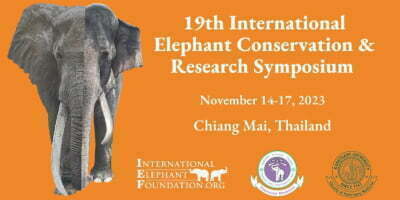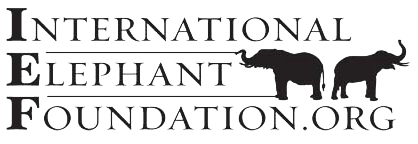Greetings,
We have so many exciting things happening in the world of IEF! Our 2023 palette of projects shows the breadth and depth of impact your support will make this year building a future where elephants thrive. We are also announcing that pre-proposals for next year’s conservation grants are now being accepted. There is important work to be done, and together we are making it happen!
Our 2023 Projects
In 2023 your support for elephants is reaching further than ever! This year we have 26 projects in 17 countries focusing on African forest elephants, African Savannah elephants, and Asian elephants. We are excited to announce our new palette of projects.
Focusing on African forest elephants:
 Guinea Forest Elephants (Republic of Guinea): Protects forest elephants through increased transboundary wildlife crime and law enforcement training, developing materials for education about wildlife laws, and increased forest monitoring including collaring elephants.
Guinea Forest Elephants (Republic of Guinea): Protects forest elephants through increased transboundary wildlife crime and law enforcement training, developing materials for education about wildlife laws, and increased forest monitoring including collaring elephants.- African Elephant Species Distribution and Movement Corridors in West Africa: Genetically determines the presence of forest elephants, savannah elephants, and hybrids across West Africa so that tailored conservation plans can be developed to maximize conservation effectiveness.
- Forest Elephant Demographic Assessment, Gabon: Determines the demographic structure of elephants and measures poaching pressures on the population in the Bateke Plateau National Park and surrounding regions using camera traps, patrols, and fecal samples.
 Saving Forest Elephants in Grebo-Krahn National Park, Liberia: Gives support to park rangers and the Regional Wildlife Crime Task Force by establishing community outreach and school wildlife clubs, and training stakeholders on wildlife legislation.
Saving Forest Elephants in Grebo-Krahn National Park, Liberia: Gives support to park rangers and the Regional Wildlife Crime Task Force by establishing community outreach and school wildlife clubs, and training stakeholders on wildlife legislation.- Protecting Elephants from Development Projects, Cameroon: Monitors and protects Ngoyla Wildlife Reserve and a known elephant corridor from habitat fragmentation while conducting community outreach and education, and supporting eco-tourism as an alternative to poaching.
Focusing on African savannah elephants:
 Conservation of Elephants in Murchison Falls Conservation Area, Uganda: Builds one additional ranger station to enhance the security and wildlife recovery of the region.
Conservation of Elephants in Murchison Falls Conservation Area, Uganda: Builds one additional ranger station to enhance the security and wildlife recovery of the region.- Big Tusker Project, Kenya: Provides aerial surveillance to the Tsavo Conservation Area which holds some of the world’s last elephants with giant tusks.
- K9 Unit Operations in Lower Zambezi, Zambia: Supports the operation of the Department of National Parks and Wildlife/Conservation Lower Zambezi K9 Detection and Tracking Unit, which helps stop and catch poachers and wildlife criminals.
- Training Village Dogs for Wildlife Protection, Zambia: Groundbreaking program investigating the viability of sourcing and training local village dogs for K9 conservation, detection, and tracking duties.
- Mount Kenya Horse Patrol Team: Supports the operation of the Mounted Horse Patrol Team protecting the UNESCO World Heritage Site of Mount Kenya and surroundings.
- Mobile Anti-poaching teams of Northern Rangelands Trust (NRT) Conservancies, Kenya: Supports the operations of the 9-1 and 9-2 Anti-Poaching Units of NRT, protecting habitat, wildlife, and elephants while a building community conservation ethic.
 Human-elephant Conflict Mitigation in the KAZA Transfrontier Conservation Area, Zambia: Conducts scientific research about elephant movement pathways, transboundary crossing points, and critical habitat areas through GPS satellite tracking collars, and works to assist farmers to peacefully coexists with elephants by mitigating the impact of elephants on livelihoods by increasing food security.
Human-elephant Conflict Mitigation in the KAZA Transfrontier Conservation Area, Zambia: Conducts scientific research about elephant movement pathways, transboundary crossing points, and critical habitat areas through GPS satellite tracking collars, and works to assist farmers to peacefully coexists with elephants by mitigating the impact of elephants on livelihoods by increasing food security.- Conserving Namibia’s Desert Elephants: Addresses human-elephant conflict by holding elephant education workshops, empowering community members to become Elephant Guards, creating an elephant identification database, working towards Elephant Early Warning Systems, and maintaining elephant corridors.
- Creating Environmental & Conservation Leadership in Malawi: Builds a community consensus for conservation through conservation education advocacy, and enhancing quality of life through bee keeping, fuel efficient cooking stoves, and briquette making.
- Converting Community Attitudes towards Conservation in Chizarira, Zimbabwe: Educates communities about elephant conservation and consequences of wildlife crime through village meetings, art, radio and TV campaigns, and empowers communities through development projects.
Focusing on Asian elephants:
 Conservation Response Units in Northern Sumatra, Indonesia: Protects Sumatran elephants in the northern region through Conservation Response Unit patrols.
Conservation Response Units in Northern Sumatra, Indonesia: Protects Sumatran elephants in the northern region through Conservation Response Unit patrols.- Way Kambas Elephant Response Units (ERUs), Sumatra, Indonesia: Protects what may be the largest connected breeding herd of Sumatran elephants in the world through Elephant Response Unit patrols based out of 4 separate locations.
- Elephant Response Teams for Human-Elephant Conflict Mitigation, Bangladesh: Strengthens 4 Elephant Response teams by providing them with equipment and training, and organizes community awareness campaigns.
- Understanding Human-Elephant Conflict in Sarpang, Bhutan: Identifies and maps human-elephant conflict hotspots and the number of people impacted, while conducting stakeholder outreach education sessions to enhance coexistence with elephants in the area.
- Human-Elephant Conflict in South-Eastern Bhutan: Takes a community-based approach to address human-elephant conflict through nature clubs, community information sessions, mapping conflict hotspots, and studying the effectiveness of mitigation measures.
 Installing Early Warning Signals for Elephants Crossing Roads, India: Sets up and tests multiple early-warning systems in key locations around Bannerghatta National Park to help minimize human and elephant casualties caused by vehicles and other human development.
Installing Early Warning Signals for Elephants Crossing Roads, India: Sets up and tests multiple early-warning systems in key locations around Bannerghatta National Park to help minimize human and elephant casualties caused by vehicles and other human development.- Community Based Elephant Conservation in Bardia-Banke Complex, Nepal: Strengthens Rapid Response Teams by developing a local human-elephant conflict plan and conducting outreach education with students and local government members.
- Community Based Elephant Conservation in Central Nepal: Supports and equips village level Elephant Response Teams, conducts local community education sessions, assesses conflict hotspots, and works to strengthen coordination and cooperation among government agencies for conservation.
- Community Support for Elephant Conservation in Far Western Nepal: Identifies and maps elephant movement corridors and conflict hotspots, conducts community outreach to local authorities about migration corridors, and forms elephant response teams to help address conflict.
Ex-Situ Research on Elephant Endotheliotropic Herpesvirus (EEHV) that benefits all elephant species:
 Plasma D-dimer Concentration in Juvenile Elephants with and without EEHV-HD: Investigates the association between plasmatic D-dimer concentrations, platelet count, and EEHV viremia to help aid in early diagnosis of EEHV and to support early therapy.
Plasma D-dimer Concentration in Juvenile Elephants with and without EEHV-HD: Investigates the association between plasmatic D-dimer concentrations, platelet count, and EEHV viremia to help aid in early diagnosis of EEHV and to support early therapy.- Development of EEHV-specific nanobodies as treatment for EEHV-hemorrhagic disease: Develops a laboratory assay to measure the neutralizing capacities of nanobodies or a “virus neutralizing assay” in order to assess nanobodies with high therapeutic/prophylactic potential.
Pre-Proposals for 2024 Funding!
 IEF is excited to be start accepting pre-proposals for 2024 Conservation and Research Grants!
IEF is excited to be start accepting pre-proposals for 2024 Conservation and Research Grants!
IEF’s Elephant Conservation and Research Funding Support grant application process is a two-part process. For applicants to be considered for funding in 2024, we require the submittal of a short pre-proposal which will be due April 28, 2023. Pre-proposals selected for further consideration will be invited to submit a full proposal by May 26, 2023 with a deadline to submit your full proposal by August 11, 2023. The selection of the final grantees will be in December 2023 for funding to be made available in 2024.
We look forward to receiving your pre-proposal!
Call for Abstracts!
 The International Elephant Foundation, the Faculty of Veterinary Medicine Chiang Mai University, the National Elephant Institute, and the Faculty of Veterinary Medicine Kasetsart University cordially invite you to present at the 19th International Elephant Conservation and Research Symposium beginning on Wednesday, November 14th, 2023 in Chiang Mai, Thailand.
The International Elephant Foundation, the Faculty of Veterinary Medicine Chiang Mai University, the National Elephant Institute, and the Faculty of Veterinary Medicine Kasetsart University cordially invite you to present at the 19th International Elephant Conservation and Research Symposium beginning on Wednesday, November 14th, 2023 in Chiang Mai, Thailand.
This symposium will bring together elephant conservationists and researchers from around the world to present on a diverse range of conservation projects and research outcomes. We are seeking abstracts covering topics related all species of elephants, EEHV in range countries, human elephant conflict deterrents, policy and land use planning, novel concepts for conservation, veterinary management, disease investigation, reproduction and behavior, conservation activities utilizing elephants in human care, and other issues that impact the long- term survival of elephants.
We look forward to working together to creating another excellent forum for which those working on behalf of elephants can share, learn, and be inspired!
Visit here for more details about the Call for Abstracts and the Symposium.



